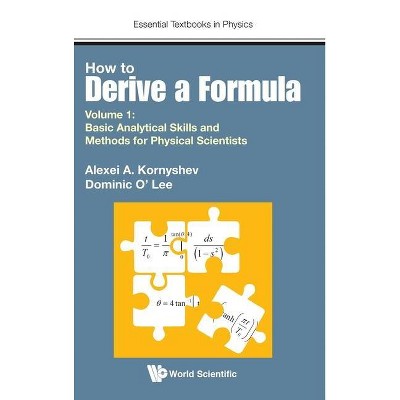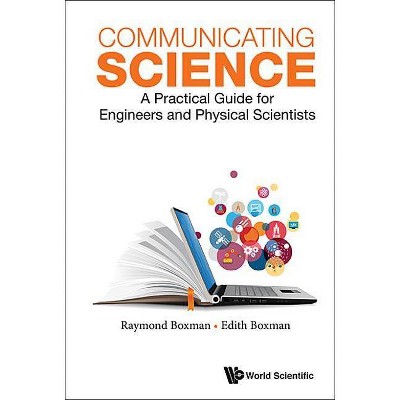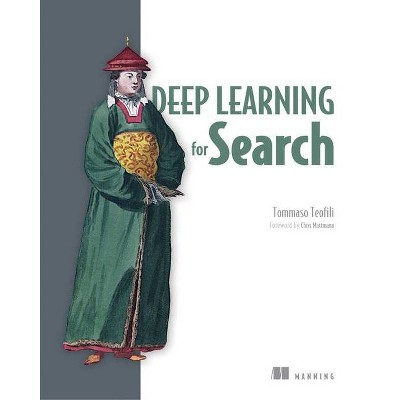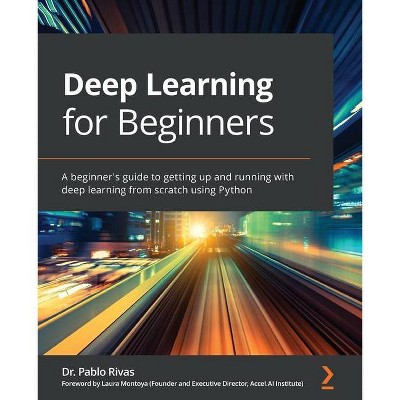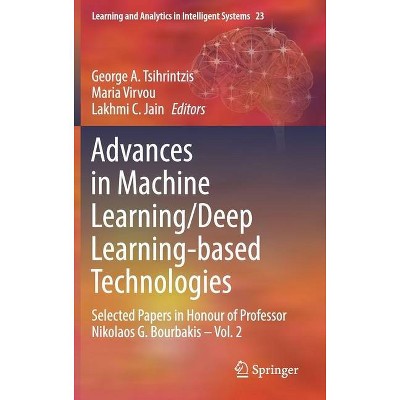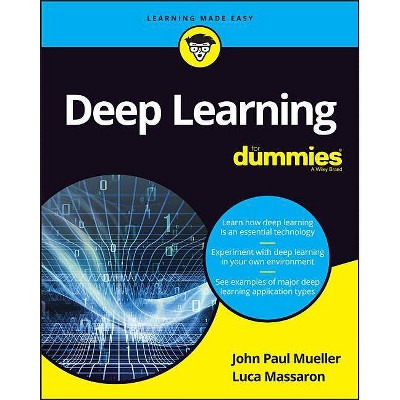Deep Learning for Physical Scientists - by Edward O Pyzer-Knapp & Matthew Benatan (Hardcover)
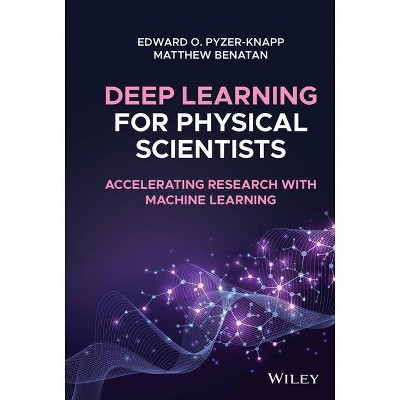
Similar Products
Products of same category from the store
AllProduct info
<p/><br></br><p><b> About the Book </b></p></br></br>"The rise of data-driven technologies such as machine learning has had wide ranging impacts, not least in the realm of physical sciences, where it is transforming the traditional mind-set about how research can, and should, be performed. Deep learning is an exciting new development in the area of machine learning, containing many powerful techniques which can benefit researchers in the physical sciences"--<p/><br></br><p><b> Book Synopsis </b></p></br></br><p><b>Discover the power of machine learning in the physical sciences with this one-stop resource from a leading voice in the field </b> </p> <p><i>Deep Learning for Physical Scientists: Accelerating Research with Machine Learning</i> delivers an insightful analysis of the transformative techniques being used in deep learning within the physical sciences. The book offers readers the ability to understand, select, and apply the best deep learning techniques for their individual research problem and interpret the outcome. </p> <p>Designed to teach researchers to think in useful new ways about how to achieve results in their research, the book provides scientists with new avenues to attack problems and avoid common pitfalls and problems. Practical case studies and problems are presented, giving readers an opportunity to put what they have learned into practice, with exemplar coding approaches provided to assist the reader. </p> <p>From modelling basics to feed-forward networks, the book offers a broad cross-section of machine learning techniques to improve physical science research. Readers will also enjoy: </p> <ul> A thorough introduction to the basic classification and regression with perceptrons </li> An exploration of training algorithms, including back propagation and stochastic gradient descent and the parallelization of training </li> An examination of multi-layer perceptrons for learning from descriptors and de-noising data </li> Discussions of recurrent neural networks for learning from sequences and convolutional neural networks for learning from images </li> A treatment of Bayesian optimization for tuning deep learning architectures </li> </ul> <p>Perfect for academic and industrial research professionals in the physical sciences, <i>Deep Learning for Physical Scientists: Accelerating Research with Machine Learning</i> will also earn a place in the libraries of industrial researchers who have access to large amounts of data but have yet to learn the techniques to fully exploit that access. </p> Perfect for academic and industrial research professionals in the physical sciences, Deep Learning for Physical Scientists: Accelerating Research with Machine Learning will also earn a place in the libraries of industrial researchers who have access to large amounts of data but have yet to learn the techniques to fully exploit that access. </i> This book introduces the reader to the transformative techniques involved in deep learning. A range of methodologies are addressed including: -Basic classification and regression with perceptrons -Training algorithms, such as back propagation and stochastic gradient descent and the parallelization of training -Multi-Layer Perceptrons for learning from descriptors, and de-noising data -Recurrent neural networks for learning from sequences -Convolutional neural networks for learning from images -Bayesian optimization for tuning deep learning architectures Each of these areas has direct application to physical science research, and by the end of the book, the reader should feel comfortable enough to select the methodology which is best for their situation, and be able to implement and interpret outcome of the deep learning model. The book is designed to teach researchers to think in new ways, providing them with new avenues to attack problems, and avoid roadblocks within their research. This is achieved through the inclusion of case-study like problems at the end of each chapter, which will give the reader a chance to practice what they have just learnt in a close-to-real-world setting, with example 'solutions' provided through an online resource. Market Description This book introduces the reader to the transformative techniques involved in deep learning. A range of methodologies are addressed including: - Basic classification and regression with perceptrons - Training algorithms, such as back propagation and stochastic gradient descent and the parallelization of training - Multi-Layer Perceptrons for learning from descriptors, and de-noising data - Recurrent neural networks for learning from sequences - Convolutional neural networks for learning from images - Bayesian optimization for tuning deep learning architectures Each of these areas has direct application to physical science research, and by the end of the book, the reader should feel comfortable enough to select the methodology which is best for their situation, and be able to implement and interpret outcome of the deep learning model. The book is designed to teach researchers to think in new ways, providing them with new avenues to attack problems, and avoid roadblocks within their research. This is achieved through the inclusion of case-study like problems at the end of each chapter, which will give the reader a chance to practice what they have just learnt in a close-to-real-world setting, with example 'solutions' provided through an online resource.<p/><br></br><p><b> From the Back Cover </b></p></br></br><p><b>Discover the power of machine learning in the physical sciences with this one-stop resource from a leading voice in the field</b></p> <p><i>Deep Learning for Physical Scientists: Accelerating Research with Machine Learning</i> delivers an insightful analysis of the transformative techniques being used in deep learning within the physical sciences. The book offers readers the ability to understand, select, and apply the best deep learning techniques for their individual research problem and interpret the outcome. <p>Designed to teach researchers to think in useful new ways about how to achieve results in their research, the book provides scientists with new avenues to attack problems and avoid common pitfalls and problems. Practical case studies and problems are presented, giving readers an opportunity to put what they have learned into practice, with exemplar coding approaches provided to assist the reader. <p>From modelling basics to feed-forward networks, the book offers a broad cross-section of machine learning techniques to improve physical science research. Readers will also enjoy: <ul><li>A thorough introduction to the basic classification and regression with perceptrons</li> <li>An exploration of training algorithms, including back propagation and stochastic gradient descent and the parallelization of training</li> <li>An examination of multi-layer perceptrons for learning from descriptors and de-noising data</li> <li>Discussions of recurrent neural networks for learning from sequences and convolutional neural networks for learning from images</li> <li>A treatment of Bayesian optimization for tuning deep learning architectures</li></ul> <p>Perfect for academic and industrial research professionals in the physical sciences, <i>Deep Learning for Physical Scientists: Accelerating Research with Machine Learning</i> will also earn a place in the libraries of industrial researchers who have access to large amounts of data but have yet to learn the techniques to fully exploit that access.<p/><br></br><p><b> About the Author </b></p></br></br><p><b>Dr Edward O. Pyzer-Knapp</b> is the worldwide lead for AI Enriched Modelling and Simulation at IBM Research. Previously, he obtained his PhD from the University of Cambridge using state of the art computational techniques to accelerate materials design then moving to Harvard where he was in charge of the day-to-day running of the Harvard Clean Energy Project - a collaboration with IBM which combined massive distributed computing, quantum-mechanical simulations, and machine-learning to accelerate discovery of the next generation of organic photovoltaic materials. He is also the Visiting Professor of Industrially Applied AI at the University of Liverpool, and the Editor in Chief for Applied AI Letters, a journal with a focus on real-world application and validation of AI.</p> <p><b>Dr Matt Benatan</b> received his PhD in Audio-Visual Speech Processing from the University of Leeds, after which he went on to pursue a career in AI research within industry. His work to date has involved the research and development of AI techniques for a broad variety of domains, from applications in audio processing through to materials discovery. His research interests include Computer Vision, Signal Processing, Bayesian Optimization, and Scalable Bayesian Inference.
Price History
Price Archive shows prices from various stores, lets you see history and find the cheapest. There is no actual sale on the website. For all support, inquiry and suggestion messagescommunication@pricearchive.us



